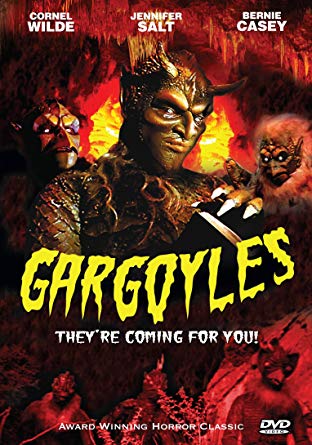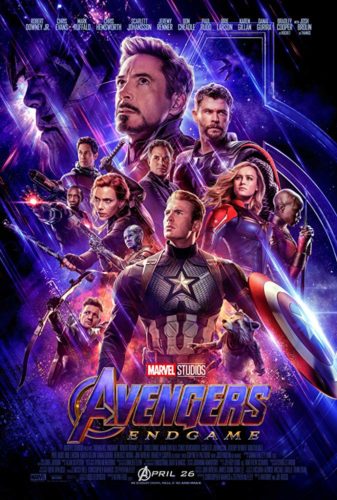 Das Boot (1981) – Doing a bit of background research for the prologue chapter of my novelization of Nazi Sharks (oh, didn’t you know that’s a thing?), so I grabbed this highly regarded wartime drama of life inside a WWII U-boat from the library. Didn’t realize that it was originally a made-for-German-TV miniseries, so when they say it’s the “original uncut version,” they don’t mean that they’re adding just a few minutes to the 149-minute American theatrical cut, they mean it’s the 293-minute miniseries. Oddly enough, the oppressive tedium adds to the movie — U-boat warfare was the best example of the definition of war as “months of boredom punctuated by moments of extreme terror.” (And even as long as it is, it still doesn’t feel as long as watching all of South Pacific…)
Das Boot (1981) – Doing a bit of background research for the prologue chapter of my novelization of Nazi Sharks (oh, didn’t you know that’s a thing?), so I grabbed this highly regarded wartime drama of life inside a WWII U-boat from the library. Didn’t realize that it was originally a made-for-German-TV miniseries, so when they say it’s the “original uncut version,” they don’t mean that they’re adding just a few minutes to the 149-minute American theatrical cut, they mean it’s the 293-minute miniseries. Oddly enough, the oppressive tedium adds to the movie — U-boat warfare was the best example of the definition of war as “months of boredom punctuated by moments of extreme terror.” (And even as long as it is, it still doesn’t feel as long as watching all of South Pacific…)
I originally intended to watch it in the original German with subtitles, but when I checked the subtitles against the dubbed dialog, I found out that the subtitles were incredibly fragmentary (understandable, I suppose, when you’re trying to keep up with spoken German). And since the entire German cast could also speak English and provided their own English-language dubbing…
 Gargoyles (1972) – This odd TV-movie has a cult following, largely because (a) a young Stan Winston contributed the gargoyle makeup, and (b) there was frickin’ gargoyle makeup in a TV-movie. It’s not a great movie; the script is perfunctory, and (truth be told) the gargoyle costumes are a bit comical, but it was an interesting experiment.
Gargoyles (1972) – This odd TV-movie has a cult following, largely because (a) a young Stan Winston contributed the gargoyle makeup, and (b) there was frickin’ gargoyle makeup in a TV-movie. It’s not a great movie; the script is perfunctory, and (truth be told) the gargoyle costumes are a bit comical, but it was an interesting experiment.
 Avengers: Endgame (2019) – As my daughter and I were statistically the last people who wanted to see Endgame but hadn’t, I know that I don’t need to summarize it for you. Instead, I’ll say that it’s so satisfying to the dreams of my misspent youth that we now live in a world in which movie versions of the comics I read as a kid can actually do justice to them, as opposed to live-action adaptations which were hampered by budgetary restrictions of “no more than X number of super-powered acts” or narrative restrictions that one couldn’t address continuity because the adaptation rights of each character/entity were farmed out to separate media companies. And unlike 90% of the DC Comics adaptations, the Marvel Cinematic Universe has been constructed by people who understood what made the stories and characters in the comics cool in the first place. (I’m sorry, this year marks HOW many mutually exclusive versions of the Joker?)
Avengers: Endgame (2019) – As my daughter and I were statistically the last people who wanted to see Endgame but hadn’t, I know that I don’t need to summarize it for you. Instead, I’ll say that it’s so satisfying to the dreams of my misspent youth that we now live in a world in which movie versions of the comics I read as a kid can actually do justice to them, as opposed to live-action adaptations which were hampered by budgetary restrictions of “no more than X number of super-powered acts” or narrative restrictions that one couldn’t address continuity because the adaptation rights of each character/entity were farmed out to separate media companies. And unlike 90% of the DC Comics adaptations, the Marvel Cinematic Universe has been constructed by people who understood what made the stories and characters in the comics cool in the first place. (I’m sorry, this year marks HOW many mutually exclusive versions of the Joker?)
It was a practically perfect movie, with three moments that made me glad to be alive.
That said, I have a couple of “hey wait” questions that, because of the infinitesimal chance of being spoilers, are herewith protected (highlight ’em to see):
- When evil Nebula, masquerading as good Nebula, returned to the present with the rest of the team and then opened a portal for Thanos to join her from five years in the past… where did she get the Pym particles to do so? A big deal had been made about the limited quantity of Pym particles available. Cap had snatched some extra Pym particles in 1970, but they were presumably still in his possession; plus, practice suggests that the Pym particles had to be with the person/object pulled through time — in other words, even if evil Nebula had had access to Cap’s Pym particle cache AND had known through good Nebula’s memories how to use them, she still wouldn’t have been able to bring Thanos and his armada to her.
- Banner’s non-explanation of how causality works in time travel was, well, a non-explanation. Apparently, some interactions with the past affect the present timeline (such as Steve Rogers staying in the past and showing up as an old man), some would create unstable alternate timelines (as the Ancient One showed to Banner), and some just didn’t make a difference at all (Nebula blowing a hole in her past self pulled into the present).
- If half the population had disappeared for five years, it’s not like they’re gonna just show back up and have it be business as usual, like showing up to high school to resume classes. Houses and other buildings will have been left derelict; food production will have gone way down. Sudden re-integration of that 50% will be at least as apocalyptic an event as their original vanishing.
- So, in his new life lived with Agent Carter from the ’40s forward, did Cap have to keep biting his tongue to keep from changing the future (which is obviously the same timeline as the rest of the story, since he appeared on that park bench)? “Don’t tell Peggy about Hydra in SHIELD, don’t tell Peggy about Hydra in SHIELD…”
[spoilers done]
.
I’ve been thinking about mice. The mouse population would have rebounded in five years, and then suddenly you add back all the vamoosed mice? Egad.
At least you’ve got all the cats back, too.
.
Lol. Point.